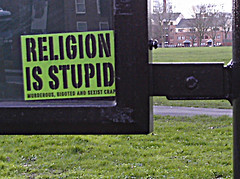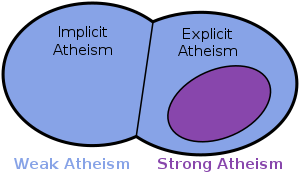Scholars don't accomplish much all by themselves. While it can be a lonely business, and we can publish papers with our names on it, the foundation of our work is how we all participate in larger conversations on broad topics and questions. These large, yearly get-togethers become critical for our work.
 Image by ruSSeLL hiGGs via Flickr
Image by ruSSeLL hiGGs via Flickr
Everyone agrees on one thing - being a Religious None does not mean a person is an atheist.
Religious Nones is a survey category, and it can be asked in a lot of ways. For example, there are people who go to church and others who do not. Among those, there are people who go to church who believe in God (as we expect), but there are people who go to church who say they do not believe in God (not many). This simple example shows how there are different ways to discover types of Religious Nones, adding further complications about what it means.
In a session with sociologist Michael Hout, he demonstrated using new data how over the past decade the proportion of Conservative Believers becoming Religious Nones is greater than any other religious group. Conservatives are moving toward Nones more than any other segment of the religious population. Hout thinks this may be due to the growth of attention on the Religious Right from the media - he showed a striking parallel between the two - and that Conservatives are eschewing the label of religion to get away from the stigma of being part of those fundamentalist-moralistic crazies.
Think about that for a moment. If Conservatives are leaving a label, are they leaving religion? Or is something else going on?
In short, are Religious Nones less "religious"? Hmmmm...
 Image via Wikipedia
Image via Wikipedia
There are probably lots of ways to be a Religious None.
Still, the notion of a Religious None has filtered it's way into congregational leader's thinking about ministry for a long time. Here's one thought -- From my own research, I believe much of the vitality we see among entrepreneurial evangelicals comes from the attempt to craft a church that will appeal to a growing culture of "Religious Nones". This has some relationship to the "unchurched" or "seeker" ideas of the last decade.
Catch the irony here - creating church for people who have rejected religion. Doing so is based on crafting our own understanding of who is rejecting "church," "God," or "religion" and why they do. Then create church (in language, ritual, style) that seeks to overcome those things.
Anyways, this is only one of several dozen ideas that flow through my head as rich information and new perspectives are being brought by the bright, curious, and ambitious scholars I encounter here every day.




1 comment:
I feel at home in your post. When studying theology in the 1980's, I heard of a New Testament scholar who said he was atheist because "I don't believe in the God I see touted in our world today." While exclusiveness can indicate arrogance, I don't don't believe it to be the case here. You are in important territory for study and understanding.
I have often responded to questions with the attitude of a "None," but not with the option listed. Thank you for introducing me to a new paradigm.
David
Post a Comment